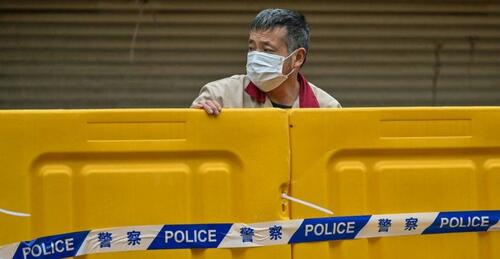Beijing Dispatches Military To Shanghai As Expanded Lockdown Triggers More Unrest
As local authorities expand what was supposed to be a staggered, nine-day lockdown in Shanghai (China’s most populous city and also its financial hub), the CCP has decided to send in the military as the backlash worsens in a city that has become a critical battleground in the government’s fight to legitimize its “Zero COVID” policy.
After the city reported a record 9,000 COVID cases, the CCP announced the deployment of thousands of soldiers and military personnel to Shanghai in order for them to assist in the mandatory screening of all 25 million inhabitants (the latest in a seemingly interminable policy of mandatory testing). The next round of nucleic acid tests will begin Monday. The reinforcements include more than 2,000 military personnel and another 30,000 “medical workers”, per CNN.
The BBC pointed out that the latest lockdown will be “particularly costly” for China’s economy – and for western companies like Tesla and Disney which have major bases of operations in the city (including Tesla’s Shanghai gigafactory).
On top of this, Shanghai is a hub for semiconductor, electronics, car manufacturing and China’s financial services industry. It is also the world’s busiest shipping port.
The CCP has struggled to meet the needs of the local population, which has grown restive in the face of shortages of essential goods like food and medicine. Cases of locals dying after being turned away from local hospitals for non-COVID-related illnesses have also rattled them.
Xu Tianchen, China economist for the Economist Intelligence Unit, warned that short-term supply chain disruptions tied to the city’s lockdown could have a serious impact on China’s economy.
“There will also be ripple effects elsewhere because of the interconnectedness between Shanghai and other regions of China, especially the manufacturing hub of the Yangtze River Delta,” he said.
What’s more, consumer spending in a city known for its luxury storefronts has also fallen precipitously. Lost business at retailers, hotels, and restaurants could directly cost Shanghai 3.7% of its annual GDP.
All of this threatens to undermine China’s target for the country’s GDP: the CCP has promised growth of 5.5% this year, but a growing number of analysts doubt that the government will achieve this goal (unless its resorts to even larger-than-normal distortions in its official economic data).
Shanghai isn’t the only Chinese city to face mass lockdowns. Shenzhen, known as China’s technology hub, and the Province of Jilin, situated in China’s industrial heartland, have also faced lockdowns earlier in the year.
But as President Xi has called for increasingly “targeted” COVID restrictions to minimize the blowback for residents, some have taken to the country’s heavily censored social media platforms to address the growing chorus of concerns, and to accuse the CCP of breaking its ‘social compact’ to take care of the population. Locals have been particularly incensed by the CCP’s decision to separate COVID positive children from their parents, triggering a wave of outrage that swept across China’s social media.
Political pressure has been mounting on Shanghai authorities to both quell the outbreak and address the growing chorus of concerns from residents grappling with the costs and inconveniences of the stringent measures.
Tyler Durden
Mon, 04/04/2022 – 19:20

